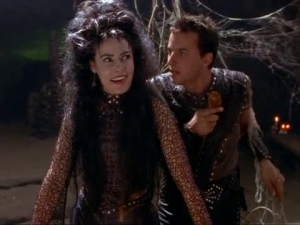Iambe: Difference between revisions
(Created page with "{{RecurringCharacters |name= Iambe<br> |actor= http://www.imdb.com/name/nm0752170/ Peta Rutter<br> |species= Human. Supposedly. <br> |occupation= Manipulative Mama<br> |episo...") |
No edit summary |
||
| (6 intermediate revisions by 2 users not shown) | |||
| Line 1: | Line 1: | ||
{{RecurringCharacters | {{RecurringCharacters | ||
|image=[[Image:Iambe.png|right|thumb|300px]]<br> | |||
|name= Iambe<br> | |name= Iambe<br> | ||
|actor= [[ | |actor= [[Peta Rutter]]<br> | ||
|species= Human. Supposedly. <br> | |species= Human. Supposedly. <br> | ||
|occupation= Manipulative Mama<br> | |occupation= Manipulative Mama<br> | ||
|episodes= [[1.24 Dad Always Liked Me Best]]<br>[[1.27 Mommy Dearests]]}} | |episodes= [[1.24 - Dad Always Liked Me Best]]<br>[[1.27 - Mommy Dearests]]}} | ||
Manipulative, psychotic, and just plain scary, Iambe is the mother of [[Lucius]]. She believes Alcmene and Hercules to be unworthy of [[Zeus]]'s attention and is very likely the reason behind Lucius's desire to annihilate the rest of Zeus's mortal children. As seen in [[1.27 Mommy Dearests]], Iambe is very quick to anger, snatching Lucius's goat stew away from him and throwing the bowl against the wall when he reveals that he hasn't killed Hercules yet. Whether or not she is actually human is debatable. | Manipulative, psychotic, and just plain scary, Iambe is the mother of [[Lucius]]. She believes Alcmene and Hercules to be unworthy of [[Zeus]]'s attention and is very likely the reason behind Lucius's desire to annihilate the rest of Zeus's mortal children. As seen in [[1.27 - Mommy Dearests]], Iambe is very quick to anger, snatching Lucius's goat stew away from him and throwing the bowl against the wall when he reveals that he hasn't killed Hercules yet. Whether or not she is actually human is debatable. | ||
[[Category:Canon]][[Category:Characters]][[Category: Humans]] | == Mythology == | ||
Iambe (Greek: Ἰάμβη) in Greek mythology was a Thracian woman, daughter of Pan and Echo, granddaughter of Hermes, and a servant of Metaneira, the wife of Hippothoon. Others call her a slave of Celeus, king of Eleusis. The extravagant hilarity displayed at the festivals of Demeter in Attica was traced to her, for it is said that when Demeter, in her wanderings in search of her daughter, arrived in Attica, Iambe cheered the mournful goddess with her jokes (Horn. Hymn, in Cer. 202; Apollod. i. 5. § 1; Diod. v. 4; Phot. BibL Cod. 239. p. 319, ed. Bekker; Schol. ad Nicand. Aleodph, 134.) She was believed to have given the name to iambic poetry, for some said that she hanged herself in consequence of the cutting speeches in which she had indulged, and others that she had cheered Demeter by a dance in the Iambic metre. | |||
[[Category:Canon]][[Category:Characters]][[Category:Humans]][[Category:Villains]] | |||
Latest revision as of 21:49, 22 February 2019
|
Manipulative, psychotic, and just plain scary, Iambe is the mother of Lucius. She believes Alcmene and Hercules to be unworthy of Zeus's attention and is very likely the reason behind Lucius's desire to annihilate the rest of Zeus's mortal children. As seen in 1.27 - Mommy Dearests, Iambe is very quick to anger, snatching Lucius's goat stew away from him and throwing the bowl against the wall when he reveals that he hasn't killed Hercules yet. Whether or not she is actually human is debatable.
Mythology
Iambe (Greek: Ἰάμβη) in Greek mythology was a Thracian woman, daughter of Pan and Echo, granddaughter of Hermes, and a servant of Metaneira, the wife of Hippothoon. Others call her a slave of Celeus, king of Eleusis. The extravagant hilarity displayed at the festivals of Demeter in Attica was traced to her, for it is said that when Demeter, in her wanderings in search of her daughter, arrived in Attica, Iambe cheered the mournful goddess with her jokes (Horn. Hymn, in Cer. 202; Apollod. i. 5. § 1; Diod. v. 4; Phot. BibL Cod. 239. p. 319, ed. Bekker; Schol. ad Nicand. Aleodph, 134.) She was believed to have given the name to iambic poetry, for some said that she hanged herself in consequence of the cutting speeches in which she had indulged, and others that she had cheered Demeter by a dance in the Iambic metre.
